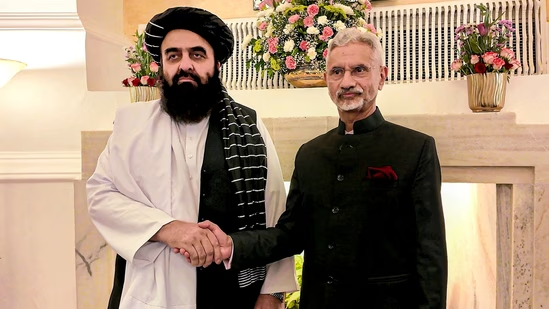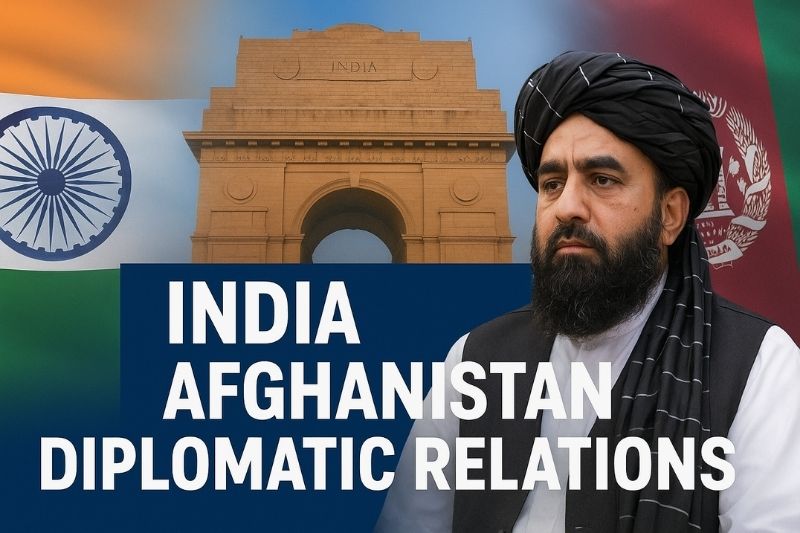The evolving landscape of India Afghanistan Diplomatic Relations has reached a defining milestone with the official visit of Taliban Foreign Minister Mawlawi Amir Khan Muttaqi to New Delhi. This historic event marks the first visit of a senior Taliban leader to India since 2021, symbolizing a diplomatic thaw and strategic recalibration. Enabled by a temporary UN sanctions waiver, the visit represents India’s transition from cautious observation to active engagement. New Delhi is now focusing on pragmatic diplomacy to balance security, economic cooperation, and regional stability.
India’s Strategic Pivot Amid Changing Regional Dynamics
India Afghanistan Diplomatic Relations have been shaped by a rapidly shifting geopolitical environment. With the Taliban’s return to power in 2021, India initially adopted a wait-and-watch stance. However, growing security concerns, humanitarian imperatives, and the need to protect its regional influence pushed India toward gradual engagement. As External Affairs Minister S. Jaishankar emphasized during talks, closer cooperation contributes not only to Afghanistan’s national development but also to broader South Asian stability.
Symbolic and Strategic Importance of Muttaqi’s Visit
The India Afghanistan Diplomatic Relations have gained renewed momentum as Muttaqi’s week-long visit included high-level talks, cultural engagements, and business discussions. His arrival in New Delhi was widely interpreted as a diplomatic breakthrough, positioning India as a significant regional player capable of balancing major powers. For the Taliban, the visit marks a major step toward international legitimacy.
Soft Power and Cultural Connections Reinforcing Engagement

India Afghanistan Diplomatic Relations are rooted not just in politics and trade but also in deep cultural and religious ties. The Taliban delegation’s visit to Darul Uloom Deoband underscored this heritage. Such symbolic gestures strengthen India’s soft power while giving the Taliban an opportunity to connect with historic allies and religious institutions.
Security, Trade, and Humanitarian Priorities
The India Afghanistan Diplomatic Relations framework is being redefined to address key priorities such as security cooperation, trade expansion, and humanitarian assistance. India has strategically focused on trade channels like Chabahar Port, infrastructure development, and security assurances to safeguard its national interests while contributing to Afghanistan’s reconstruction.
- Historic Diplomatic Breakthrough
India Afghanistan Diplomatic Relations took a historic turn on October 9, 2025, when Taliban Foreign Minister Muttaqi arrived in New Delhi after receiving a temporary UN waiver. This marks the first high-level Taliban visit since their return to power in 2021. India is now carefully balancing its national security concerns with strategic diplomacy.
- India’s New Diplomatic Calculus
India Afghanistan Diplomatic Relations reflect a shift from isolation to engagement. India’s calibrated approach highlights regional stability and economic cooperation. The visit comes at a time when regional powers like China and Russia are also engaging with the Taliban, making India’s participation crucial to regional equilibrium.
- Soft Power Dynamics at Play
India Afghanistan Diplomatic Relations have long benefited from cultural linkages. The Taliban’s warm reception at Deoband seminary reinforces India’s influence in religious and cultural spheres, while also subtly signaling its ability to engage with diverse actors for broader strategic outcomes.
- Economic Imperatives Driving Engagement
The deepening India Afghanistan Diplomatic Relations are influenced by the potential for economic cooperation. Afghanistan’s vast mineral wealth and India’s interest in alternative trade corridors create opportunities for mutual benefit, particularly through Chabahar Port and dry fruit exports.
- Security and Counter-Terrorism Alignment
Security remains central to India Afghanistan Diplomatic Relations. India’s priority is to ensure that Afghan soil is not used for anti-India terrorism. The Taliban pledged to combat IS-K, al-Qaeda, and other groups, signaling a shared interest in regional security.
Tracing the Past: Evolution of India Afghanistan Diplomatic Relations
The India Afghanistan Diplomatic Relations are built on a long history of cultural exchange, anti-colonial solidarity, and strategic cooperation. India has invested over $3 billion in Afghan infrastructure, including the Parliament building and Salma Dam, highlighting its role as a key development partner. However, the Taliban’s takeover in 2021 disrupted this trajectory, forcing India to recalibrate its approach.
Historical Cultural and Political Ties
India Afghanistan Diplomatic Relations stretch back centuries, with deep cultural and religious connections shaping bilateral cooperation. These ties were further solidified during the anti-colonial struggle when Indian scholars supported Afghan resistance against British rule.
Post-2001 Cooperation and Development Aid
Following the fall of the Taliban in 2001, India became one of Afghanistan’s top development partners, investing in large-scale infrastructure and capacity-building projects. These efforts positioned India as a trusted partner in Afghanistan’s reconstruction era.
Diplomatic Disengagement Post-2021
India Afghanistan Diplomatic Relations faced unprecedented strain after the Taliban regained control of Kabul in 2021. India withdrew its diplomatic staff and suspended formal ties, channeling aid through international agencies to avoid direct engagement with the Taliban.
Gradual Re-engagement Through Humanitarian Assistance
India’s gradual re-engagement started with humanitarian aid. Over 500,000 tons of wheat, vaccines, and medical supplies were provided to Afghanistan, showcasing India’s continued commitment to the Afghan people despite political uncertainties.
- Deep Cultural Heritage
India Afghanistan Diplomatic Relations are underpinned by shared historical and religious traditions. Institutions like Deoband played an influential role in shaping early interactions between both nations. This cultural bedrock remains crucial in diplomatic dialogues.
- Infrastructure and Aid Contributions
India invested over $3 billion in Afghanistan before 2021. Projects like the Salma Dam, Zaranj-Delaram highway, and the Parliament building symbolize India’s role in Afghanistan’s modernization and development.
- Policy Reset After Taliban Takeover
The Taliban’s rise to power in 2021 forced a reassessment of India Afghanistan Diplomatic Relations. India adopted a cautious, humanitarian-focused approach to maintain goodwill while avoiding political entanglements.
- Strategic Engagement through Multilateral Channels
India’s participation in platforms like the Moscow Format allowed it to indirectly engage with Taliban representatives. This provided the diplomatic space for later direct interactions.
- Rebuilding Ties through Aid and Security
India’s humanitarian initiatives and security-focused dialogues have paved the way for re-establishing India Afghanistan Diplomatic Relations on new, more pragmatic foundations.
Diplomatic Engagements and New Announcements Redefining Ties

The recent India Afghanistan Diplomatic Relations milestone has produced tangible announcements that reflect both nations’ readiness to institutionalize cooperation. These include embassy upgrades, humanitarian aid expansions, joint trade committees, and security assurances designed to balance opportunities with risks.
Embassy Upgrade and Diplomatic Formalization
India Afghanistan Diplomatic Relations took a leap forward with the elevation of India’s Kabul Technical Team to a full-fledged embassy. This ends a four-year diplomatic vacuum and opens channels for structured dialogue.
Health and Humanitarian Initiatives
The visit led to major humanitarian commitments, including medical infrastructure, ambulances, and disaster relief assistance. These efforts are designed to strengthen people-to-people bonds and stabilize Afghanistan’s fragile health sector.
Trade Committees and Economic Partnerships
The establishment of a joint trade committee is a cornerstone of the evolving India Afghanistan Diplomatic Relations. This initiative aims to unlock $1B+ trade potential by addressing logistics and transit challenges.
Security Commitments and Counter-Terrorism Cooperation
Security cooperation remains central to bilateral engagements. Taliban officials assured India that Afghan territory would not be used for terrorism, signaling willingness to collaborate on counter-terrorism and regional stability.
- Embassy Upgrade to Strengthen Diplomatic Channels
India Afghanistan Diplomatic Relations gained institutional strength with the decision to restore embassy functions in Kabul. This step allows for direct diplomatic communication, visa processing, and project coordination.
- Humanitarian Support Addressing Crisis
As per MEA, India’s aid package includes 20 ambulances, MRI and CT scan equipment, vaccines, and earthquake relief, addressing Afghanistan’s humanitarian crisis that currently affects over 24 million people.
- Trade Expansion with Strategic Routes
India Afghanistan Diplomatic Relations are expected to thrive economically through Chabahar Port, bypassing Pakistan’s transit barriers. This will enable smoother export of Afghan dry fruits, minerals, and energy resources.
- Security Cooperation to Counter Terrorism
India’s engagement focuses heavily on preventing terrorist groups like IS-K and Lashkar-e-Taiba from exploiting Afghan territory. Taliban commitments on this front are crucial for India’s security interests.
- Strategic Leverage Through Humanitarian Engagement
By intertwining aid with strategic dialogue, India Afghanistan Diplomatic Relations are being positioned as both compassionate and pragmatic, giving India leverage to encourage internal reforms.
Regional Implications and Strategic Realignments
The strengthening of India Afghanistan Diplomatic Relations reverberates across South Asia, influencing power balances and diplomatic strategies. Pakistan, China, Russia, and the U.S. are all closely monitoring this shift as it impacts their regional interests.
Pakistan’s Diplomatic Dilemma
India Afghanistan Diplomatic Relations are reshaping the regional balance, creating unease in Pakistan, which views India’s growing role in Kabul as a strategic challenge. The Taliban’s increasingly independent stance is testing Islamabad’s influence.
U.S. and Western Policy Calculations
The U.S. withdrawal left a vacuum that regional powers are now filling. India’s engagement with the Taliban contrasts with Western reluctance but aligns with its long-term security and economic interests.
China and Russia’s Calculated Welcome
China and Russia see India’s engagement as an opportunity to stabilize Afghanistan without overreliance on Beijing. This multi-polar diplomacy may reduce the risk of unilateral influence in Kabul.
Soft Power Diplomacy Through Cultural and Religious Ties
India Afghanistan Diplomatic Relations leverage soft power to achieve geopolitical stability. Cultural diplomacy, religious engagements, and humanitarian support enhance India’s credibility in Afghanistan.
- Pakistan’s Growing Discomfort
India Afghanistan Diplomatic Relations are challenging Pakistan’s historical influence in Kabul. With trade routes like Chabahar bypassing Pakistan, Islamabad faces strategic isolation.
- Contrasting U.S. Stance
India’s pragmatic diplomacy contrasts with the U.S. sanctions-driven approach. This could influence future UN deliberations on Taliban recognition and sanctions relief.
- China and Russia Factor
India’s involvement provides a balancing force against Chinese dominance in Afghanistan. Russia, through the Moscow Format, supports such balanced engagements.
- Cultural Diplomacy as a Strategic Tool
India’s emphasis on soft power through Deoband visits and religious dialogue strengthens its position in Afghanistan without direct military involvement.
- Regional Stability through Multipolar Engagement
India Afghanistan Diplomatic Relations are contributing to a multipolar regional order, reducing dependency on any single external actor.
Future Outlook: Prospects and Challenges for India Afghanistan Diplomatic Relations
The future of India Afghanistan Diplomatic Relations depends on sustained engagement, security assurances, and economic partnerships. While the visit has set a strong foundation, challenges like Taliban inclusivity, international scrutiny, and terrorism concerns remain.
Economic Expansion and Investment Potential
India’s interest in Afghanistan’s lithium and copper reserves offers significant economic opportunities. Chabahar Port can be leveraged for increased trade, potentially crossing $1B annually within a few years.
Security Cooperation and Counter-Terrorism Mechanisms
Sustained India Afghanistan Diplomatic Relations will rely on the Taliban’s ability to prevent terrorism against India. Security collaborations could extend to intelligence-sharing and joint operations against IS-K and other threats.
Diplomatic Recognition and International Legitimacy
India continues its policy of de facto engagement without formal recognition. Future diplomatic recognition may hinge on the Taliban’s inclusivity and human rights track record.
Soft Power and Humanitarian Leverage
India’s humanitarian support provides diplomatic leverage, allowing it to nudge the Taliban on issues like women’s education and inclusive governance.
- Economic Engagement through Chabahar Port
India Afghanistan Diplomatic Relations could unlock major trade flows through Chabahar Port, reducing transit dependence on Pakistan. This would give India strategic economic leverage in the region.
- Security Ties to Combat Common Threats
Cooperation against IS-K and other terrorist groups is essential for stable India Afghanistan Diplomatic Relations. Shared intelligence mechanisms can help safeguard both nations.
- Human Rights as a Diplomatic Lever
India can use humanitarian and development aid to encourage Taliban reforms, particularly in women’s education, which remains a key international concern.
- Balanced Diplomacy without Recognition
India’s non-recognition policy allows it to engage pragmatically without compromising its global commitments to democratic values.
- Soft Power for Long-Term Influence
India Afghanistan Diplomatic Relations benefit from cultural affinity, which could be pivotal in maintaining influence even amidst shifting geopolitical tides.
Conclusion: A Defining Chapter in India Afghanistan Diplomatic Relations
The visit of Taliban Foreign Minister Muttaqi has opened a new chapter in India Afghanistan Diplomatic Relations. India has transitioned from cautious distance to strategic engagement, positioning itself as a key regional stabilizer. This pragmatic diplomacy blends soft power, economic interests, and security assurances, reflecting a mature foreign policy shift.
However, challenges remain, especially regarding Taliban’s domestic governance, women’s rights, and regional security risks. India’s careful balancing act could shape the future of South Asian geopolitics, making this moment a defining milestone in bilateral and regional relations.
India Afghanistan Diplomatic Relations are no longer defined solely by past uncertainties,they now carry the weight of strategic potential and mutual opportunities.
(Sources: https://www.un.org, https://www.unocha.org, https://www.mea.gov.in)
Keep your eyes on Trending Eyes for real-time insights and analysis.
Post Views: 86








1 Comment
Usually I do not read article on blogs however I would like to say that this writeup very compelled me to take a look at and do so Your writing taste has been amazed me Thanks quite nice post